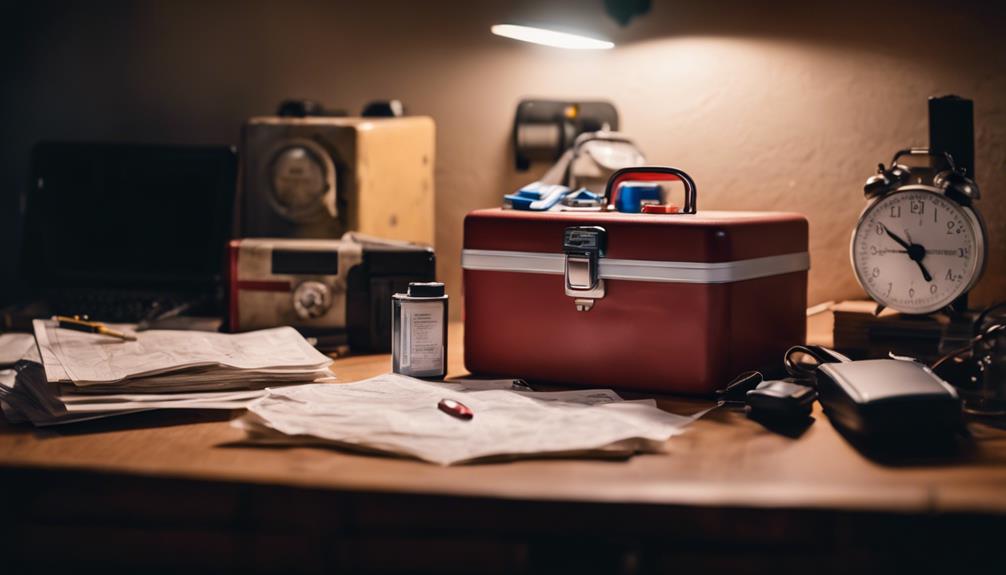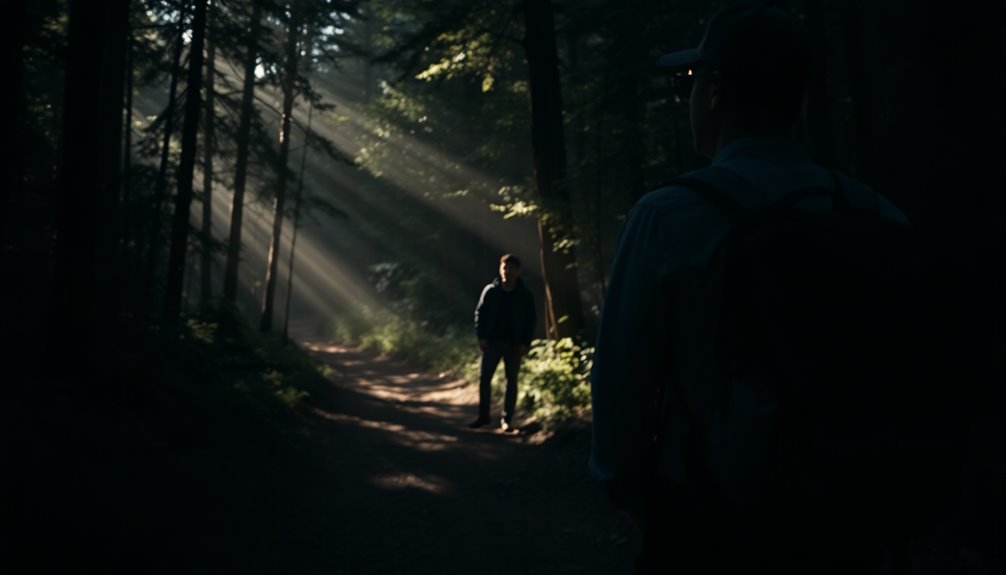In an emergency, having essential documents organized and accessible can make all the difference. You'll want to collect key items like identification documents, financial records, and legal papers. Gather birth certificates, Social Security cards, insurance policies, and medical records. Don't forget copies of your property ownership documents and any critical health information. Store these in a fireproof and waterproof safe, and consider keeping digital copies as backups. Regularly update your inventory to maintain current information. Being prepared can markedly ease your stress during crises. Keep going to discover more about which specific documents you'll need in various scenarios.
Key Takeaways
- Keep copies of essential identification documents like birth certificates, Social Security cards, and passports for identity verification during emergencies.
- Organize financial records, including tax documents, insurance policies, and bank statements, to facilitate quick access and claims processing.
- Maintain legal documents, such as wills and powers of attorney, to ensure your wishes are honored and supported during emergencies.
- Store medical records that include immunization records and a list of medications to provide necessary health information to providers.
Importance of Document Readiness
Document readiness is essential because it allows you to quickly access important identification and legal papers during emergencies, ensuring smooth interactions with emergency services. When you have important documents like birth certificates, passports, and insurance policies organized and accessible, you can expedite recovery processes after a disaster. This preparedness not only saves time but also reduces stress and chaos, allowing you to focus on safety instead of frantically searching for paperwork.
Keeping your documents secure is imperative for your peace of mind. Store them in a fireproof, waterproof safe or maintain digital copies to protect against loss from natural disasters. Regularly reviewing and updating your document inventory every six months helps keep your information current and readily available when you need it most.
In emergencies, having the right documents can greatly enhance your security, ensuring you have what's necessary to navigate the situation. So, take the time to prepare and organize these documents. By doing so, you'll be better equipped to handle emergencies, allowing you to respond effectively and with confidence.
Prepare for natural disasters by having copies of important documents such as identification, insurance policies, and medical records in a secure waterproof container. Keep digital copies of these documents on a secure cloud service as well. This comprehensive preparation will not only provide peace of mind but also make it easier to access vital information during a crisis.
Family and Identification Documents

When emergencies strike, having essential identification copies on hand is vital.
You'll need documents like birth certificates and Social Security cards to prove your identity and access necessary services.
Additionally, marital and family proof, such as marriage licenses and adoption papers, can help you navigate legal and financial matters during a crisis.
Essential Identification Copies
Have you considered the importance of having copies of essential identification documents ready for emergencies?
Keeping copies of important legal documents like birth certificates, driver's licenses, and passports can make a significant difference during a crisis. These documents not only prove your identity and citizenship, but they also help streamline processes when you need assistance.
Don't forget your Social Security card; having copies of this important document is vital for identity verification and accessing health care benefits when you need them most.
Additionally, maintaining copies of marriage or divorce papers can help clarify your marital status in urgent situations, impacting legal and financial matters.
If you have adopted children, make certain you also have copies of adoption papers. These documents are essential to confirm your legal relationship and protect their rights.
Store all of these copies in a secure yet easily accessible location. This way, you'll be prepared to provide necessary documentation for recovery and support during an emergency.
Taking these steps now will save you time and stress when it matters most.
Marital and Family Proof
Keeping essential marital and family proof documents organized can greatly ease the stress of managing emergencies. You'll want to guarantee you have key documents handy, like marriage certificates, birth certificates, and Social Security cards. These not only affirm your identity but also establish legal relationships and eligibility for benefits.
Here's a quick reference table for the documents you should prioritize:
| Document Type | Importance |
|---|---|
| Marriage Certificates | Establishes legal marital status |
| Birth Certificates | Proves identity and citizenship for family members |
| Social Security Cards | Needed for identity verification and social services |
| Adoption Papers | Confirms legal relationships with adopted children |
Having copies of these documents can make a significant difference during crises. They help streamline processes for insurance claims, access to services, and support for your family's rights. Additionally, keeping recent family photos can aid in reuniting separated family members. Guarantee that all these documents are stored securely yet remain accessible during emergencies.
Financial and Property Documents

When emergencies strike, having your financial and property documents organized can save you a lot of stress.
You'll need essential records like tax information and insurance policies to guarantee you can access funds and file claims quickly.
Don't forget to keep proof of ownership for your properties handy, as these documents are vital for any legal or financial matters that may arise.
Essential Financial Records
Essential financial records are vital for managing emergencies and ensuring you can access necessary funds and support. To be prepared, you should make copies of important documents and store them in a safe place. Here are some essential records to keep handy:
| Document Type | Purpose | Notes |
|---|---|---|
| Tax Documents | Income verification | Last year's tax returns |
| Insurance Policies | Accessing claims | Homeowners and auto insurance |
| Bank Account Statements | Access to funds | Recent statements and numbers |
| Financial Obligations | Managing expenses | Mortgage and utility bills |
| Property Documents | Proof of ownership | Certified copies of deeds |
Property Ownership Proof
Having proof of property ownership is essential for maneuvering through emergencies and ensuring you can quickly access necessary resources. Property ownership proof, like certified copies of deeds and mortgage notes, establishes your legal right to your property and protects you against disputes. This documentation is vital in situations where you need to secure loans or financial assistance after a disaster.
To protect these important legal documents, store copies of your property titles in a fireproof and waterproof safe or an off-site location. This way, you safeguard them from potential loss or damage during emergencies. Having clear documentation, including chain of title documents, facilitates a smoother recovery process when dealing with property-related claims.
Regularly reviewing and updating your property records guarantees that all information is accurate and readily accessible when needed in an emergency situation. Don't forget to include copies of these essential documents in your emergency kits, ensuring you're fully prepared to tackle any challenges that come your way.
Insurance Documentation Importance
Understanding the importance of insurance documentation can greatly impact your financial recovery during emergencies. This documentation serves as essential proof of coverage, allowing you to file claims efficiently after a disaster.
Keep your homeowners, auto, and renters insurance policies in an easily accessible location to guarantee you can find them quickly when needed. Missing documentation could lead to delays or loss of benefits.
The declarations pages of your policies provide important information like coverage limits, policy numbers, and contact details for your agents. This information is crucial for effective communication with insurers during stressful times.
Additionally, maintaining copies of your insurance documents alongside property titles and deeds helps streamline the claims process by verifying ownership and the value of your insured assets.
Regularly reviewing and updating your insurance documentation is also imperative. It guarantees that your coverage is aligned with your current circumstances, such as recent purchases or changes in property value.
Legal and Medical Documents

Legal and medical documents play a vital role in guaranteeing your wishes are respected and that you receive the appropriate care during emergencies. It is important to have a well-organized collection of these documents to facilitate quick decision-making and treatment.
Here's a quick overview of important legal and medical documents you should have:
| Type of Document | Description |
|---|---|
| Legal Documents | Wills and Powers of Attorney guarantee your wishes are honored. |
| Medical Records | Include medical history and insurance information for healthcare providers. |
| Advance Healthcare Directives | Specify your healthcare preferences in case you can't communicate. |
| Immunization Records | Keep track of vaccinations to avoid complications. |
| Emergency Contacts | List of key contacts for quick access to care. |
Having these documents readily available can greatly enhance your ability to navigate emergencies effectively. Make certain you update your medical records regularly and keep your legal documents in a secure, accessible place. This preparation can make all the difference when time is of the essence.
Allergy and Medication Management

When emergencies arise, knowing your family's allergies and medications can be vital for guaranteeing timely and effective medical care. You should maintain a thorough list of all regular medications for each family member, including dosages and prescribing doctors. This important information assures continuity of care and helps medical professionals respond appropriately.
Also, keeping an updated record of serious allergies is imperative. This documentation prevents exposure to allergens and enables quick medical responses in crisis situations. Make certain to include this allergy information in your disaster prep kit, so it's easily accessible when you need it most.
Concise summaries of serious diagnoses or past procedures should also be documented. This guarantees relevant health information is available to healthcare providers during emergencies. Regularly review and update these records to reflect any changes in health status or treatment plans. This way, you're always prepared for unforeseen circumstances.
Document Storage Strategies

How can you best guarantee that your important documents are readily accessible during emergencies?
Start by storing original documents in a fireproof and waterproof safe to protect them from disasters like fires or floods. Organize these important papers in a binder or folder, making it easier to grab everything you need on short notice.
Consider off-site storage options, such as a safety deposit box, for additional security and to safeguard your documents from home-related disasters.
Regularly review and update your document storage strategy—ideally every six months—to ascertain all information is current and accessible. This step helps you avoid scrambling to find outdated documents during a crisis.
Don't forget about creating electronic copies of your important documents. Utilize digital storage solutions like cloud services or external hard drives for easy retrieval and backup in case of loss.
By having both physical and electronic copies, you'll enhance your document storage strategy, ascertaining your important information is secure and accessible whenever you need it most.
Take these proactive steps now, and you'll be better prepared for any emergency that may arise.
Backup Methods for Documents

Creating reliable backup methods for your important documents guarantees you're prepared for any emergency situation that may arise.
Start by making certain you have both physical and digital copies of your essential records. Utilize cloud services or external hard drives to create secure electronic backups, making sure they remain accessible when you need them most.
Regularly update these digital backups and maintain physical copies, storing them in a fireproof and waterproof safe. This helps protect against disasters while still allowing easy access. If you're dealing with sensitive information, consider employing encryption for added security against unauthorized access.
Don't forget to maintain a schedule for backups—ideally monthly or annually—to make certain your documents are current and accurately reflect your situation.
Additionally, create multiple backup locations, such as off-site storage options like safety deposit boxes. This further protects your important records against potential loss due to unforeseen events.
Creating an Emergency Backup Plan

An effective emergency backup plan guarantees you're prepared to access your important documents quickly and efficiently during a crisis. Start by conducting an inventory of all essential documents, categorizing them into identification, financial, medical, and legal. This way, you won't overlook anything vital.
Next, make a schedule for regular backups, whether monthly or annually, to confirm your document copies stay current. It's also wise to designate trusted individuals who can access your backup documents during an emergency, so your plan isn't reliant on just one person.
Utilize checklists to systematically verify that all necessary documents are included in your backup plan. This will help streamline the updating process and give you peace of mind that everything's in order.
Don't forget to regularly review and update your emergency backup plan—ideally every six months—to adapt to any changes in your personal circumstances or account information. Finally, integrate your important documents into your emergency kit, confirming they're easily accessible when you need them most. Being proactive now can save you time and stress later.
Recovery Steps After an Emergency

Evaluating the situation and ensuring your safety are essential first steps after an emergency before you start retrieving important documents or belongings.
Once you're safe, follow these recovery steps to help you get back on track:
- Contact Authorities: Report any damages or injuries to local authorities and emergency services. This can assist with insurance claims and expedite recovery.
- Gather Important Documents: Locate critical paperwork, including insurance policies, medical records, and proof of income. These documents will support your recovery efforts and help you access necessary services.
- Reach Out to Financial Institutions: If you've lost or damaged your credit or debit card, report this immediately. They can guide you in replacing lost documents and securing your accounts.
Don't forget to utilize community resources and support services for additional assistance. They can provide food, shelter, and counseling to help you cope with the aftermath.
Conclusion
In the whirlwind of an emergency, you don't want to be caught without your essential documents, like a ship lost at sea without a compass.
By gathering your family, financial, and medical papers, you create a lifeboat to navigate turbulent waters.
Store them wisely and have backups ready, so you can weather any storm.
Remember, preparing now means you can sail smoothly into recovery later, turning chaos into calm when the skies clear.










